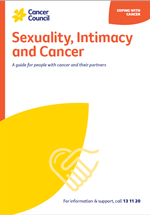- Home
- About Cancer
- Managing side effects
- Sexuality, intimacy and cancer
- Overcoming specific challenges
- Adapting to life after a brain tumour
Adapting to life after a brain tumour
As brain tumours do not affect sexual organs, you may not expect sexuality to change. However the brain is responsible for sexual urges, thoughts and behaviours.
The areas most commonly involved in sexual functioning include the frontal, temporal and parietal lobe, and pituitary gland. When these parts are injured, it can cause problems with behaviour, thinking and memory, personality and social skills.
Possible changes in sexuality after a brain tumour include:
- loss of libido or sexual drive
- having an increased desire for sex (hypersexual)
- inability to achieve or maintain an erection
- difficulty or inability to orgasm
- premature ejaculation
- talking a lot about sex or inappropriate touching (disinhibition)
- weakness in an arm or leg, or slow and uncoordinated movements
- fatigue
- changes in self-image and relationships.
If you have become uninhibited or hypersexual after surgery, your family and friends may ask you to masturbate in private and not to make sexual comments. For help following brain cancer, call Cancer Council on 13 11 20 or visit buildingthebridge.com.au.
The most distressing time for me was immediately post op when my side effects were many, varied and quite severe, even though most turned out to be temporary.
Ian
Podcast: Sex and Cancer
Listen to more of our podcast for people affected by cancer
More resources
Dr Margaret McGrath, Head of Discipline: Occupational Therapy, Sydney School of Health Sciences, The University of Sydney, NSW; Yvette Adams, Consumer; Dr Kimberley Allison, Out with Cancer study, Western Sydney University, NSW; Andreea Ardeleanu, Mental Health Accredited Social Worker, Cancer Counselling Service, Canberra Health Service, ACT; Kate Barber, 13 11 20 Consultant, Cancer Council Victoria; Dr Kerrie Clover, Senior Clinical Psychologist, Psycho-Oncology Service, Calvary Mater Newcastle, NSW; Maree Grier, Senior Clinical Psychologist, Royal Brisbane and Women’s Hospital, QLD; Mark Jenkin, Consumer; Bronwyn Jennings, Gynaecology Oncology Clinical Nurse Consultant, Mater Health, QLD; Dr Rosalie Power, Out with Cancer study, Western Sydney University, NSW; Dr Margaret Redelman OAM, Medical Practitioner and Clinical Psychosexual Therapist, Sydney, NSW; Kerry Santoro, Prostate Cancer Specialist Nurse Consultant, Southern Adelaide Local Health Network, SA; Simone Sheridan, Sexual Health Nurse Consultant, Sexual Health Services – Austin Health, Royal Talbot Rehabilitation Centre, VIC; Prof Jane Ussher, Chair, Women’s Heath Psychology and Chief Investigator, Out with Cancer study, Western Sydney University, NSW; Paula Watt, Clinical Psychologist, WOMEN Centre, WA.
View the Cancer Council NSW editorial policy.
View all publications or call 13 11 20 for free printed copies.
Need to talk?
Support services
Coping with cancer?
Speak to a health professional or to someone who has been there, or find a support group or forum
Life after cancer treatment
Webinars, exercise and nutrition, sexuality programs, and back-to-work support
Cancer information
Your coping toolbox
Strategies for managing difficult situations during and after cancer treatment
View our publications
Guides and fact sheets for people with cancer, their families and friends

